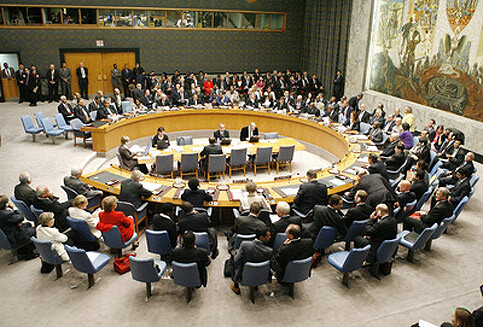United Nations News Service 21 September 2006

The Security Council met at the ministerial-level to discuss the situation in the Middle East. (UN Photo/Marco Castro)
Addressing the General Assembly in New York today, the President of Lebanon decried the devastation wrought by Israel on his country but said there is now a new opportunity for peace that must be exploited.
Emile Lahoud voiced regret that during Israel’s aggression against his country, the Security Council “looked powerless in its attempts to stop the slaughter of Lebanon’s children and protect the peace in Lebanon and the Middle East.”
He noted that it took over a month to produce a cessation of hostilities that is yet to become a formal ceasefire. This raised serious questions about the UN’s ability to safeguard peace “when its resolutions are subjected to the vagaries of a very few world powers.”
He said it was time to ask Israel, which owed its existence to a UN resolution, to fully abide by Council resolutions. While Lebanon had deployed soldiers on its southern border, Israel had been daily breaching resolution 1701 (2006), imposing a humiliating siege on Lebanon and refusing to withdraw from the Shebaa Farms. It also refused to give to the UN maps of the landmines it had laid on Lebanese soil.
President Lahoud called on those present to “differentiate between he who defends his country against Israeli aggression and occupation and strives to liberate his countrymen from decades of unlawful imprisonment and those elements who perpetrate acts of wanton slaughter against their countrymen and others equally.”
“Despite the horrid events in Lebanon, a window of opportunity has presented itself and should be fully exploited in order to reinvigorate the Middle East Peace Initiative that was founded on the Arab Peace Initiative adopted during the Beirut Arab Summit of 2002,” he said.
The 2002 Arab Peace Initiative remained the best way forward, as it called for implementation of all UN resolutions pertaining to an Israeli withdrawal from occupied Arab lands and a return of Palestinian refugees, he said. Only this could provide Lebanon and its neighbours the stability they longed for, and give Israel a sense of security.
“Should our conception of peace in the Middle East become reality, I can assure you that the need for conferences, studies and discussions of terrorism would become moot,” he said. “Should this happen in tandem with serious attempts to combat poverty and sustain acceptable levels of development in needed areas, this will certainly parch the pools where terrorism draws its human and financial support.”